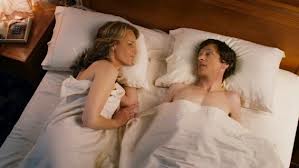I liked The Sessions but when you step back at look at it, like so many indie films, it seems comprised of a number of components rather familiar to the territory. First, it offers us something marked as distinctly ‘uncomfortable’, in comparison with the norms of the mainstream, in its focus on a central character who is very seriously disabled – and, then, more so, for many sensibilities, in its focus on the sexual life of such a character. Discomfort, in various forms and to various degrees, is a frequent indie characteristic. But the sexual component also gives it a distinctively more commercial skew, sex of course tending tending to be a major ‘selling’ ingredient that has long been drawn upon in art and indie film, and here involving plenty of nudity.
I found much the same characteristically indie/Indiewood balance (the film being a Fox Searchlight release, although independently produced) in the handing of different elements of the denouement (spoiler alert if you’ve not seen the film). At one point, it seems as if a  more ‘real/normal’ relationship will develop between the protagonist, polio-stricken Mark (a largely horizontal John Hawkes) and the sex surrogate, Cheryl (Helen Hunt), he employs to  help him to get over his anxieties and to lose his virginity. The two clearly start to develop ‘serious feelings’ for one another, but the film withdraws from the relationship, briefly sketching the outlines of what will clearly be a fulfilling tryst with another woman.  The most obvious romantic cliche is thus avoided – very much indie style – but a happy resolution is implied in this dimension. No sooner has this been done, though, than we find ourselves at Mark’s funeral. So, he’s died (it was previously more than hinted that his lifespan was likely to be nearing its end, hence the desire to achieve consummation), which is not most people’s idea of a happy ending. All in all, a mix of up- and down-beat factors that works nicely but that again seems quintessentially indie in the careful working out of the balance.
Does this make the film contrived or guilty of being some kind of boiler-plate indie? Such accusations of this kind are often levelled at indie films, and might have some purchase in some cases. But there’s always a danger in such suggestions of implying the existence of some ‘pure’ and unsullied version of indie to which such films can be opposed. There are, of course, many varieties of indie and differing degrees to which they depart from the norms of the mainstream – but notions such as the ‘true’ indie tend to involve rhetorical over-simplication. They buy into a ‘purist’ notion of indie – or, often, ‘independent’, these discourses often tending to see ‘indie’ itself as some kind of sell-out construction – that is far more the stuff of myth than reality. Powerful myth, nonetheless, and a key component of some of the prevailing discourses of indie/independence – something I discuss at greater length in the introduction to my forthcoming book, Indie 2.0.


